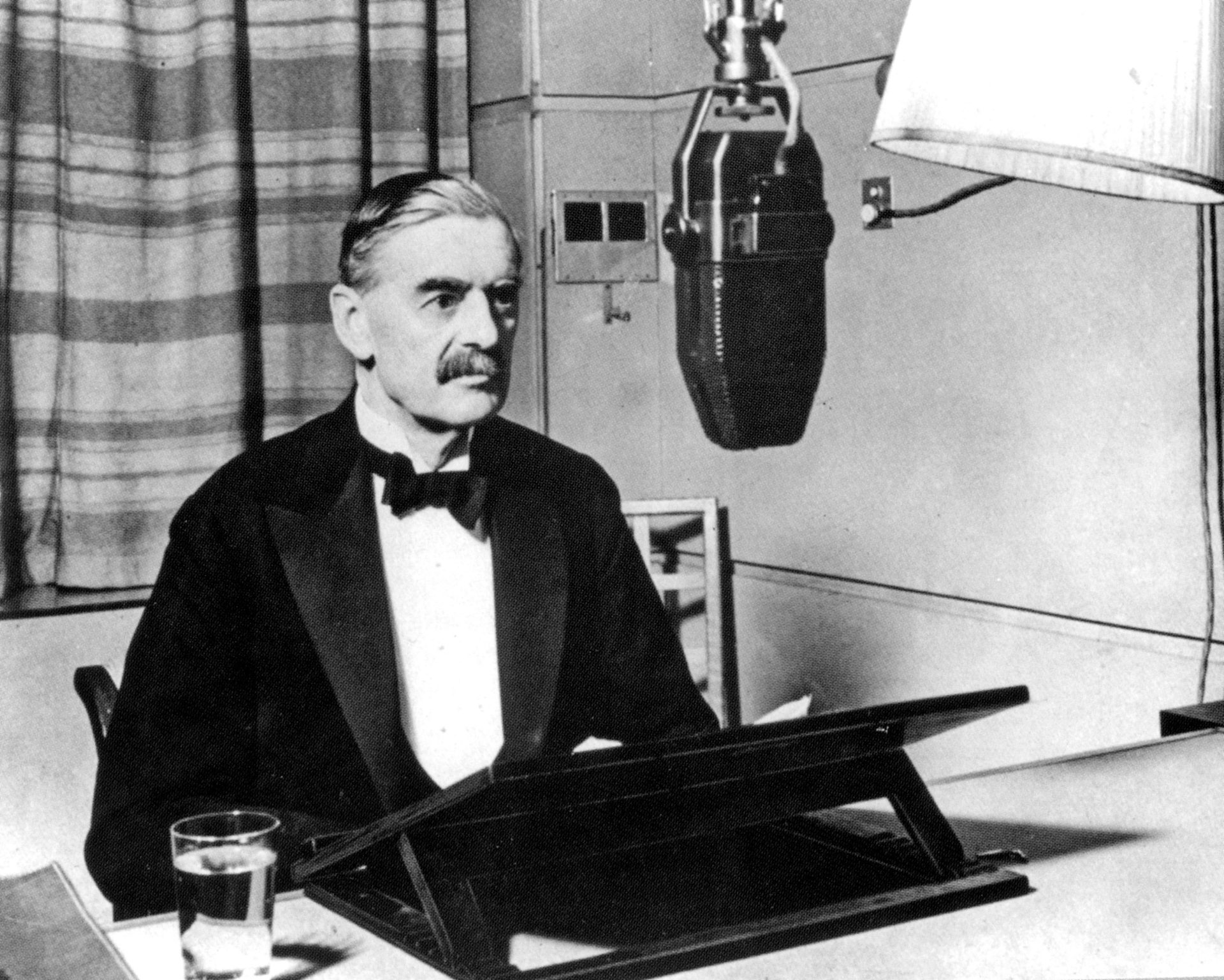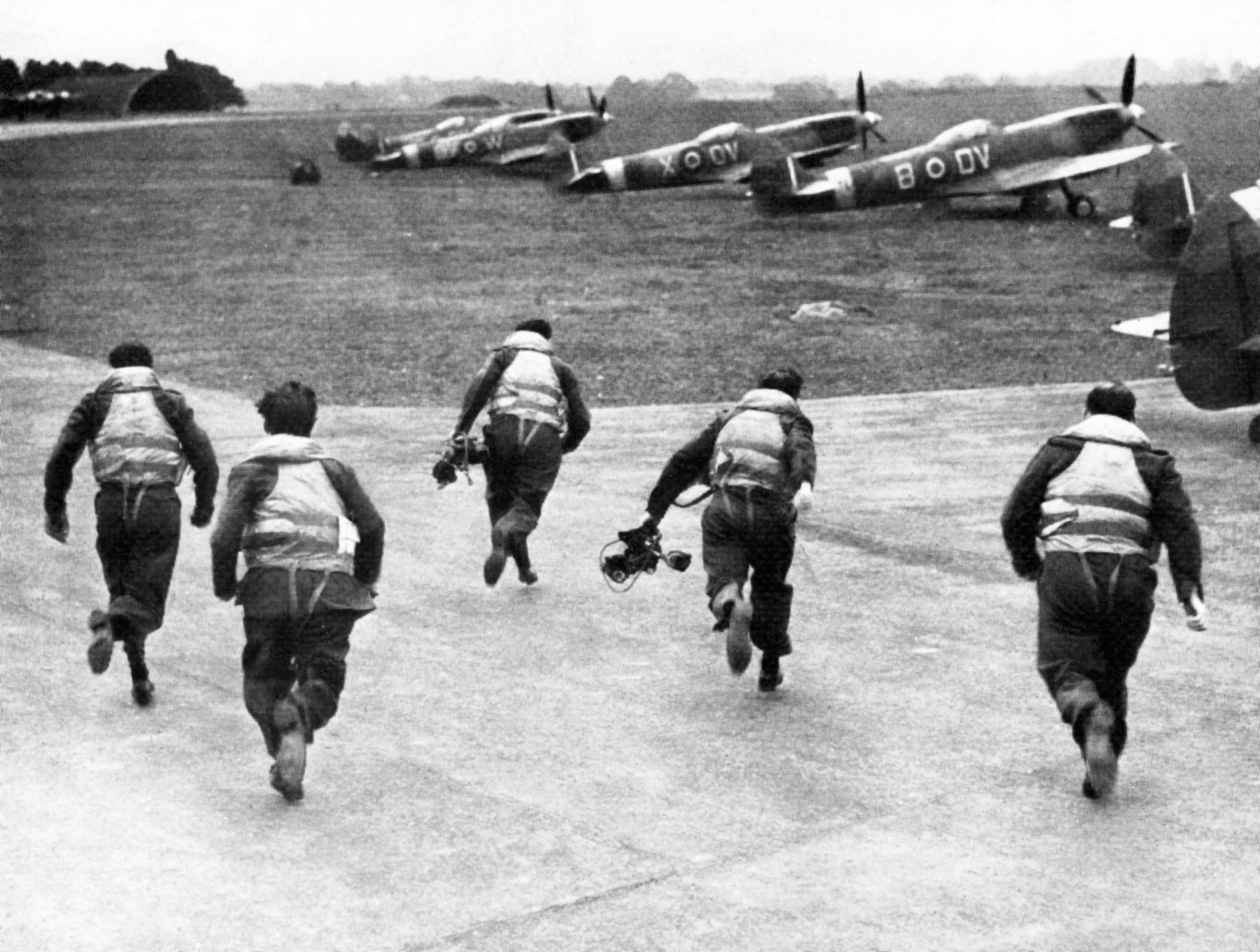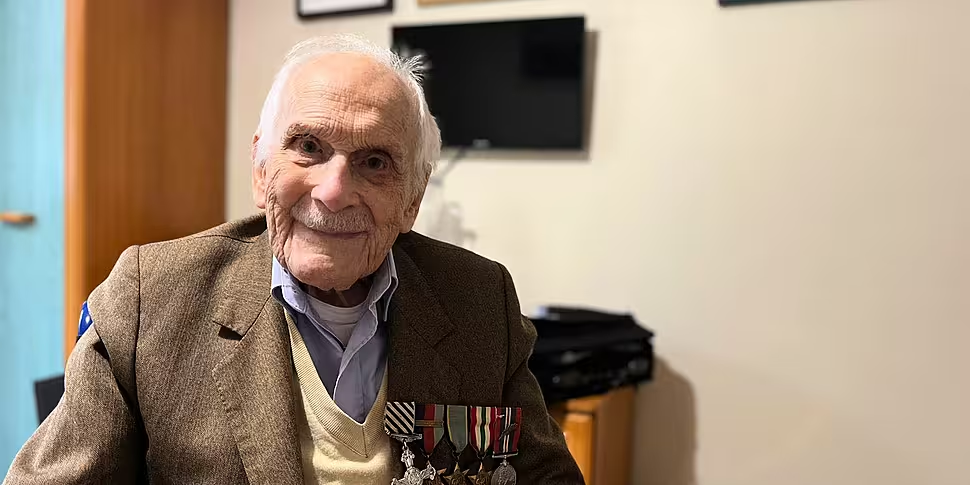If there is one word that sums up Battle of Britain veteran Group Captain John Hemingway DFC and his extraordinary life it is the word “lucky”.
In August 1940, as the battle was at its zenith, Winston Churchill rose to his feet in the British House of Commons and told MPs that, “Never in the field of human conflict was so much owed by so many to so few.”
Ever since, Battle of Britain pilots have been known as ‘The Few’ but now Mr Hemingway is the only one left and is living out a quiet retirement in a nursing home in Foxrock, County Dublin.
The fact that he is alive at all is in itself something of a miracle. Shot down four times during the war, on one occasion, he returned to base and found his belongings had been cleared away. His comrades knew he was missing and had assumed he was dead.
Speaking to Newstalk, Mr Hemingway describes himself as a “very lucky Irishman” who loved his career in the RAF, despite the dangerous work and the loss of so many friends at the hands’ of the Nazis.
“I was lucky, I regarded myself as lucky in the Air Force I was in and the people I flew with,” he said warmly.
For most people, the turbulent events of the 1940s seem like the most distant of history but for Mr Hemingway the Second World War still is very real. His room is decorated with pictures of the planes he flew during the war, the manager of the care home snaps a smart salute when she sees him and his memories of those he served with remain sharp.
On #BattleofBritain80 Day we remember the Few. In particular the very last of them here in Dublin, Gp Capt John Hemingway RAF DFC ☘️ #BOB80 #BattleOfBritain @RoyalAirForce @RAFBF @RBL_Ireland @RAFAssociation pic.twitter.com/wzIMpfZgNX
— UK Defence in Dublin (@UKDefenceDublin) September 15, 2020
Born in July 1919 in Dublin, the young John had an idyllic childhood; full of rugby matches, piano practice and long summer holidays on the Wicklow coast. With adulthood looming, his father sat him down and the pair narrowed his life path down to two options - did he want to study at Trinity College or join the RAF? Mr Hemingway chose the latter and a ticket to England was purchased for him.
In the 21st century, it can be easy to underestimate how glamorous flying was in the 1930s. Many people had never even seen a plane and the idea of actually travelling in one was fanciful; an impossible luxury only the super wealthy could dream of.
Joining the military was the only way to fly with the birds and touch the heavens above. For good reason, the RAF was sometimes described as the world’s most exclusive flying club.
Nor was Mr Hemingway the only Irishman to cross the Irish Sea and swear to serve King and Country in the Royal Air Force. Dubliner Brendan ‘Paddy’ Finucane was the son of a 1916 rebel who became a celebrated flying ace and painted shamrocks onto the side of the planes he flew.
John ‘Killy’ Kilmartin was a “sleekly handsome” Dundalk man who had lived an exotic life flitting between Ireland, an Australian cattle station, Shanghai and now RAF bases.
Before the war, life for Mr Hemingway as a young pilot in 85 Squadron was idyllic. His weeks were filled with flying and the weekends were for socialising in London where RAF pilots in their smart blue uniforms were as popular as film stars.
But war was looming. The Munich Agreement that handed the helpless Sudetenland to Hitler bought Britain time - but only a few months. The pleasantly gentlemanly atmosphere of the RAF disappeared. Airmen no longer clocked off at 4pm and took Wednesday afternoon off to play sport. The focus switched relentlessly towards the looming conflict.
In September 1939, Mr Hemingway was sitting in the mess when a gloomy Neville Chamberlain announced that the Nazis had refused to leave Poland and, as a consequence, "This country is at war with Germany". Mr Hemingway and his colleagues were now combatants in the deadliest conflict the world would ever see.
 Neville Chamberlain as British Prime Minister broadcasting the declaration of war on Germany 3 September 1939.
Neville Chamberlain as British Prime Minister broadcasting the declaration of war on Germany 3 September 1939.Despite initial feelings of isolation and uncertainty, the early months of the Second World War were some of the happiest of Mr Hemingway’s military career.
The eight month ‘Phoney War’ was a period with very limited military action in Western Europe and 85 Squadron was stationed in the north of France, where he was tasked with patrolling the Channel to protect British shipping from attack.
In December 1939, Britain's King George VI visited 85 Squadron and a raffle win meant he spent Christmas at home in Dublin.
“I liked being in the RAF, I liked travelling in France,” he recalled simply.
1940 brought darker times. On May 10th, the Phoney War came to a violent end when Hitler ordered his troops to advance west. The Battle of France had begun and on May 11th, Mr Hemingway was shot down over Belgium. As he trudged west, his parachute still on his shoulder and his uniform soaked through with oil, he was recognised as a British airman and greeted with warm smiles by refugees fleeing the Nazis.
During May 1940, 85 Squadron, including F/O John Hemingway (last known veteran of the Battle of France & last of “The Few”) flew Hurricanes in the Battle of France before flying air patrols over Dunkirk. We remember their brave sacrifice. Per Ardua ad Astra.
All photographs ©IWM pic.twitter.com/lhVcXvg9l0— Royal Air Force (@RoyalAirForce) May 25, 2020
On June 17th, the French Government telegrammed Berlin, pleading for an armistice. The Battle of France had lasted just six weeks and a triumphant Hitler travelled to Paris where he posed for pictures while smirking beside the Eiffel Tower.
"What General Weygand called the Battle of France is over. I expect that the Battle of Britain is about to begin. Upon this battle depends the survival of Christian civilisations,” Churchill told the Commons.
"Let us therefore brace ourselves to our duties, and so bear ourselves that if the British Empire and its Commonwealth last for a thousand years, men will still say, 'This was their finest hour'."
 Fighter pilots scrambling for their Spifires during the Battle of Britain.
Fighter pilots scrambling for their Spifires during the Battle of Britain.The Battle of Britain began on July 10th and it fell upon Mr Hemingway and his comrades to defend the skies of the United Kingdom from the bombs and the bullets of the Luftwaffe. Despite the danger, Mr Hemingway felt certain of victory.
“I never doubted the fact that the RAF was better than the enemy. Never,” he said proudly.
“I don’t know why but when we took off to fight, I reckoned I was part of the better squadron.”
Still, even if it was a necessary task, Mr Hemingway never relished getting into dog fights with Luftwaffe aircraft. He was highly trained but he found the business of shooting down enemy pilots an unpleasant one.
“I didn’t like it,” he said.
“It was an aeroplane and therefore I shot it down… It gave me a lot of confidence for the future; that confidence grew - I was lucky.”
The last known Battle of France and Battle of Britain pilot, Group Captain (retired) John Hemingway, was gifted a replacement uniform from the RAF, after he wished he had been in uniform when he met the @ChiefofAirStaff earlier this year.
Full story: https://t.co/IU4NnDcKLY🎄 pic.twitter.com/K3JIaBTzt3— Royal Air Force (@RoyalAirForce) December 21, 2021
Of the 2,917 airmen who flew as combatants during the Battle of Britain, 544 of them were killed and one of them was Dickie Lee, a particularly good friend of Mr Hemingway’s.
“He was my first commander,” Mr Hemingway recalled fondly.
“He was amazing - nobody could touch him! He was the best pilot in the air force and very kind to me.”
On August 18th, a date which went down in history as the RAF’s ‘Hardest Day’, Mr Hemingway and Dickie Lee took off as normal and flew towards the coast. Both were shot down but only one of them managed to make it back to base. After two and a half hours swimming through the North Sea, Mr Hemingway was spotted by a boat and rescued.
“I remember that day,” he said.
“I remember life afterwards, Dickie Lee just wasn’t there. I still remember it.
“When I was shot down in the sea, I didn’t like that at all. I thought I was going to die.”
Happy Birthday to Wing Commander John Hemingway. He is 103 years old today and the last known survivor of the @RoyalAirForce Battle of Britain pilots and aircrew. The last of The Few.
Many happy returns, sir. #PerArduaAdAstra https://t.co/09CzdT4LSt pic.twitter.com/11NhcOgZnT— RAF Cosford (@RAF_Cosford) July 17, 2022
Days later, Mr Hemingway was back in the skies and shot down again, this time over the marshes of Essex.
“Some pilots were continuously lucky and other pilots were continuously unlucky,” is his assessment of his survival.
After the Battle of Britain, Mr Hemingway was awarded the Distinguished Flying Cross for his heroism.
For much of the rest of the war, he was placed on desk duties and was part of the RAF’s plotting team during the D-Day landings of 1940. It was essential work - but it lacked the excitement of flying combat missions. After a refresher course, he was sent to Italy where he was to fly Spitfires.
By 1945, the Nazis were swiftly retreating but they still managed to shoot down Mr Hemingway for the fourth and final time. He survived thanks to the kindness and bravery of a local girl who led him through the woods past German sentries. With the help of Italian resistance fighters, he managed to return safely to his unit. Another lucky break in a lifetime filled with lucky escapes.
Ireland's call
After the war, Mr Hemingway continued to serve with the RAF, before retiring with the rank of Group Captain in 1969. For years he had a nomadic existence, living in England, followed by a spell in Canada where his daughter lives. Well into his 90s, he told his family he was moving back to Ireland and where he has been ever since.
“Dublin is my city,” he said.
“I enjoy being here more than anywhere else - although I did enjoy being in London - this is still my home.
“I was always an Irishman fighting for the English.”
In 2020, Paul Farnes and William Clark passed away. Churchill’s Few had dwindled to just one - Group Captain John Hemingway DFC of Dublin.
That he has outlived all his comrades is “surprising”, he smiles with characteristic modesty.
You can listen back here:
Main image: Group Captain John Hemingway.









